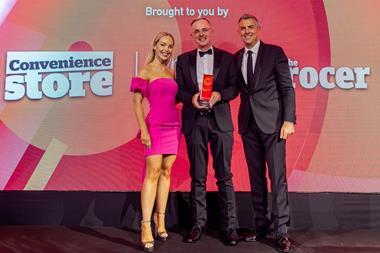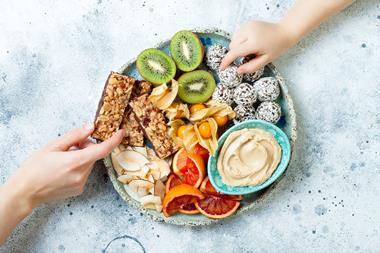Our C-Store Champions have experienced the good, bad and ugly of local product sales, but agree it’s important to support small suppliers
David Charman, Spar Parkfoot, West Malling, Kent
David sees plenty of benefits in dealing with local suppliers and likes to stock goods that set his store apart from the rest
John Perrett, Hunnyhill Group, Spar, Isle of Wight
John has reduced his local range greatly over the past 18 months as interest in Spar lines has increased
Donna Morgan, Brownlie’s Best-one, Biggar, nr Edinburgh
Brownlie’s is well-known for stocking local lines and Donna is often approached by new small suppliers
Simon Biddle, Biddles Simply Fresh, Worcestershire
Simon likes to give small businesses like his own support and has built strong relationships with his suppliers
What local products do you stock?
David: We sell Nip from the Hip flavoured gins and vodkas, from Maidstone in Kent. Before we sold them they were only available at farmers’ markets. People think it’s great because previously they’ve had to wait for the market to come back around. Cook’s Kitchen ready meals is a Kent supplier which didn’t want to sell to us because we are a petrol station, but we explained to them that we are a convenience store first, and a garage second. It’s a local product we are really proud to be selling. We also sell hay from a local farmer. He came to us and said “I don’t know if you can sell this” but we said we’d give it a go and now we sell about £1,000-worth every month.
John: I barely stock any local products now. I sell Isle of Wight ice cream and soft and blue cheese, but they are the only two. I used to stock a lot more, but about 18 months ago we started reducing these lines. I think local products have the perception of being expensive, which can make shoppers wary. Spar branding is genuinely a lot better than it was, say, five years ago, plus I think the improved perceptions of Lidl and Aldi have improved perception of own-brand products in general. It’s also made people more aware that they can buy good-quality products for very good prices. As a retailer you’ve got to stock what customers purchase and you can’t keep stocking products which are constantly going to reduction.
Donna: We have a local butcher who comes in with stock three times a week; Border Biscuits, which are produced just 30 minutes up the road; Simple Simon Pies are also a neighbour. We have flowers from a local nursery in the summer and do a curry that a man produces locally. Alcohol is popular, such as Scottish gin, whisky and wine, then honey, jam, pickles, and loads of other products. It’s something we gradually built up over the years.
Simon: We try to buy a lot of stuff locally. We use a local baker for fresh bread and a local butcher for fresh meat, and local cheese. I source fruit & veg and milk locally. We get ale from a local brewery called Purity Ales which is about six miles away. We’re just tying up with another local brewery at the moment which is only about three miles away. They’re going to bottle some beers for us.
Why is it important to you to sell local products?
David: I think it’s within our nature to support the underdog, but as far as Parkfoot is concerned we are more interested in trying to have a range of products from small suppliers, not just local suppliers. These are products which can’t be found in supermarkets that are more unusual. If customers can only get a certain product from our store it makes us look good. Take Harveys beers – it’s from the county next door (Sussex). You can’t buy a bottle of Harveys beer in this county unless you come to us. They don’t have barcodes on their bottles because they usually only sell to pubs, but we deal with that because it’s worth it to sell something different.
John: We understand that it is important to support local suppliers and we are not close-minded to the idea of trying new products.
Donna: It’s an important point of difference for us, which sets us apart from shops like Sainsbury’s and the larger stores. There’s no point selling all the same things as them. We like to do things a wee bit differently. You also get a better margin with those products. People are happy to pay a premium when they know it’s a local product. Obviously, that varies depending on the store. We are in a fairly affluent area so people are happy to pay a little bit more for premium products. We are proud to sell local products. People often come in and specifically ask for local products so it’s important for us to have a good range, especially as we’ve built a reputation for it now.
Simon: Most of the suppliers are small businesses like us, so it’s nice to support one another and to have a good relationship with other small businesses.
What are the benefits of working with a local supplier, as opposed to a national supplier?
David: There are lots of benefits. Local suppliers will recommend other suppliers and other products, which helps you to increase your range. It’s nice to be able to build relationships with suppliers, too. Our local egg supplier will call us on a Monday, ask us how many eggs we need, and usually the owner will deliver them the next day. We have more than 70 suppliers now, which makes work harder, but the small suppliers need to be given a chance and are often very loyal.
John: You feel you are helping local employment, local people and the local economy and you’re pushing a high-quality product.
Donna: They can react quicker to your requirements. For example, when we were running out of meat at Christmas we called the butcher and he got it to us that afternoon. We also started to run out of Border Biscuits before Christmas and we called them and they brought us some more that night. Local suppliers want to sell as much as they possibly can so they will work hard to get their products to you.
Simon: If you have any issues with orders it’s sorted with no problems, whereas with a big company it’s harder. For example, it’s not as easy to confirm what’s been signed for and what’s not. If you run out of something you can just ring the small supplier direct and ask for more and they are happy to help.
What are the challenges that come with supplying local products?
David: They can struggle to provide you with what you need. If a small supplier decides to go on a two-week holiday then suddenly I won’t have a supply. This happens a lot around Christmas. It’s a real challenge because we have a shelf that has a label and needs a product. It makes us look bad. We have a small supplier who we have to pay on delivery. Lots of small companies need retailers to follow their way of trading, usually because of cash flow. They often aren’t able to market their products so it’s up to us to explain to customers what they are all about.
John: Distribution is a challenge in comparison with Spar, which provides a delivery six days a week of chilled, frozen and groceries. It is able to provide that service because it is delivering to 14 stores in the Isle of Wight. The small suppliers are only distributing their one product so it can be a real challenge to provide the supply that we need in our store.
Donna: It’s always been positive from our point of view. We get to discuss pricing and margins with the supplier as often you are speaking to the owner of the company. They care about providing a good service.
Simon: Most of them put their own labels on, but some don’t so I do it for them. You can buy cheaper from national companies, but I think a lot of local companies do try to make the best quality they possibly can.
How do you display local produce?
David: With Blakemore Fine Foods we have little cards in front of the products, maybe with a picture of the supplier and their product, and an explanation of who they are, where they’re from and what their product is.
John: We display them alongside the other products in that category, with the Spar brand and other branded items, but have shelf-edge labels to explain what the product is.
Donna: We have shelf-edge labels informing customers if the product is sourced from Scotland or from within 30 miles of the store. We also tell people about the local products through Facebook.
Simon: We offer them next to national brand to provide choice, but I usually find the local products sell better. Some products come to me without labels so I do that for them.
Which local products do you think are must-haves for c-stores?
David: We have honey that comes from West Malling. Honey needs to be a local product because that’s good for hay fever as it can help you build up a tolerance to the pollen in the air. We have a local egg supplier who we have used for about 25 years who sells big eggs and free range eggs. We then have Spar budget eggs. The big eggs are probably the most popular.
John: That’s hard to answer as the local products I sell are strong sellers, but wouldn’t necessarily be must-haves for other c-stores. At the end of the day, customers want good-quality products at the right price. Any local products which fit that description are likely to sell.
The C-Store Champions are a group of experienced retailers who understand the role of the local store in their community. They are tuned into the demands and desires of their customers and believe in continual development of their businesses. Each month the Champions share their expertise
Donna: Meat from the local butcher. People always like to hear it’s local. But it depends on your demographic as to how much people are willing to spend on certain items and what you are known for. For example, our customers would be upset if we didn’t have our plants from the local nursery in the summer because they are used to us selling those every year.
Simon: It really depends on the area of the c-store, the demographic and how affluent the area is. That will affect what is popular and what is expected. If you are a retailer competing against lots of other local stores you might have to worry more about competitive pricing than we do.
Are there any local products you’ve tried stocking which were not good sellers?
David: We had a fish supplier who did smoked fish. It didn’t quite work, which was a shame because it was a great product. Fresh produce and limited-life products are harder to manage.
John: We had a local biscuit supplier which sold really high-quality biscuits. We replaced a branded biscuit with this local product. I had high hopes, but they did not sell. I had to bring the national brand biscuit back in.
Donna: I can’t think of any. Shoppers in our store are always looking for different products and are happy to try new things.
Simon: I can’t think of anything we’ve tried that hasn’t worked!
How do you go about sourcing local suppliers?
David: Blakemore Fine Foods is a company which finds small suppliers and gets their products to market. We buy products through that supply chain. I also go to farmers’ markets. But these won’t just showcase local products as there will be suppliers from all over the country. I also attend the county shows which are where small suppliers look to promote themselves. The likes of Tesco won’t be found there.
John: We are always happy to hear about new products from local suppliers. With the Isle of Wight ice cream, they approached us about a year ago.
Donna: I go to the Good Food Show in Edinburgh where there are lots of speciality, local and national suppliers. Sometimes local suppliers will contact us directly because we are well-known for selling speciality products.
Simon: Often it’s word of mouth. Sometimes customers will recommend suppliers. Just recently a shopper told me about some ‘amazing’ local pies so I rang the company up. I have been stocking them since November and now we sell out every week.
Which are the strongest sellers?
David: Biddenden Vineyard - about 15 to 20 miles away - makes cider which is extremely popular. We’ve sold it for ever really, but we didn’t really promote it before we had our refit; it was just on the bottom shelf collecting dust. Now that we have a range of ciders it sits in the fridge next to them and is possibly one of the most popular. It goes to show you have to present these things properly.
John: The Isle of Wight ice cream is very popular. It’s the sort of Ben and Jerry’s end of the range. It comes in 1ltr tubs and sells all year round.
Donna: Border Biscuits are our best-selling local product. We have a one-metre display, eight shelves high. Although that’s a national brand it is very local and very popular. We have the full range and have their special gift packs at different times throughout the year. Gins have gone through the roof over the past couple of years so we’ve increased our range in line with increased sales.
Simon: It all sells well. Customers do like products being local. I think it’s been drummed into people that it helps the carbon footprint and the local economy, and they might even know the local suppliers or drive past them frequently.
















![C-Store_Champions_logo-CHOSEN[1] 2023](https://d2dyh47stel7w4.cloudfront.net/Pictures/380x253/6/5/7/301657_cstore_champions_logochosen12023_817064.jpg)




No comments yet